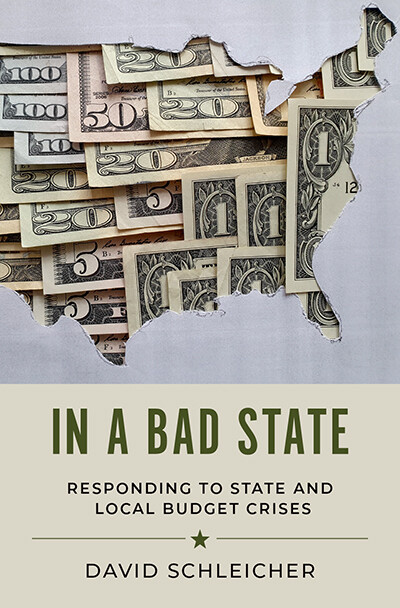What States and Cities Can Do about Debt

In his new book In a Bad State: Responding to State and Local Budget Crises (Oxford University Press, 2023), Professor David N. Schleicher gives federal policymakers “a practical guide” for when states and cities cannot pay their debts. Schleicher uses economics, political science, law, and history to explain what the federal government can — and cannot — do to provide for the general welfare during state and local defaults.
In a Bad State begins with what Schleicher calls a “trilemma.” No matter what the federal government does when a state or city faces a default crisis, he writes, it runs three risks: the economic turmoil that results from austerity measures; the moral hazard of state and local officials taking bailouts for granted; and the likelihood that lenders will not support municipal infrastructure if there is a default. “At best,” Schleicher concludes, “the federal government can prevent two of them. It has to pick its preferred poison.”

While he does not sugarcoat the constraints that face federal policymakers, Schleicher argues that appointed and elected officials have a wider range of policy options available than is often presumed to address these crises or prevent them from happening in the first place. He formulates four principles — prudence, balance, spreading, and resilience — to guide their decisions, suggesting policies ranging from changing the tax exemption on municipal bonds interest to offering state governments the option of filing for municipal bankruptcy.
In a Bad State seeks to rectify long-standing shortcomings in the literature about budget crises at all levels of government. “Scholarship and elite discussion around these issues,” Schleicher writes, have ignored “many of the real concerns created by state and local fiscal distress.” Schleicher draws on his expertise in the field of local government to unravel the tradeoffs that shape state budgeting — and lead to its failure.

For Schleicher, In a Bad State comes at a propitious moment. Three years ago, the COVID-19 pandemic sparked widespread fears that state and city governments, which had suddenly lost much of their tax revenue, would have no choice but to default. Schleicher notes that the worst-case scenario did not come to pass, leaving the United States with a rare opportunity to prepare for future crises. He describes In a Bad State as “an effort to take advantage of this lull to develop some new ideas about how federal officials and voters alike should think about the problem of state and local fiscal stress.”
David N. Schleicher4 is Professor of Law at Yale Law School and an expert in a wide range of topics, which include election law, land use, federalism, and municipal bankruptcy. He’s been described as “one of the most brilliant and far-ranging political thinkers of his generation,” (Benjamin Wallace-Wells, The New Yorker) and “the leading lawyer on state and city governments.” (Dick Ravitch, ’58, Former Lt. Gov. of New York and Chairman of the Metropolitan Transportation Authority). Schleicher previously served as Associate Professor of Law at George Mason University School of Law, which recognized him with its Teaching Excellence Award. He has also taught at Georgetown University Law Center, Harvard Law School, and New York University School of Law. Schleicher has published dozens of law review articles and written widely in popular outlets such as The New York Times, Slate, and The Atlantic. He co-hosts “Digging a Hole: The Legal Theory Podcast5” with Chancellor Kent Professor of Law and History Samuel Moyn.


